Caryn
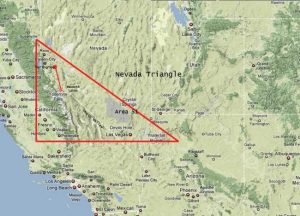
 I think we have all heard of the Bermuda Triangle, where planes and ships have mysteriously gone missing in the Atlantic Ocean for decades, but most people are not aware that there is a similar place in Alaska and one in Nevada. The Nevada Triangle lies in a region of the Sierra Nevada Mountains in Nevada and California. In that area, some 2,000 planes have been lost in the last 60 years. That may not seem significant, but when you break it down, it is about 3 crashes/disappearances a every month of those 60 years. The Nevada Triangle is more than 25,000 miles of mountain desert. It is a remotely populated area, and many of the crash sites have never found.
I think we have all heard of the Bermuda Triangle, where planes and ships have mysteriously gone missing in the Atlantic Ocean for decades, but most people are not aware that there is a similar place in Alaska and one in Nevada. The Nevada Triangle lies in a region of the Sierra Nevada Mountains in Nevada and California. In that area, some 2,000 planes have been lost in the last 60 years. That may not seem significant, but when you break it down, it is about 3 crashes/disappearances a every month of those 60 years. The Nevada Triangle is more than 25,000 miles of mountain desert. It is a remotely populated area, and many of the crash sites have never found.
The triangle location is roughly defined as spanning from Las Vegas, Nevada; to Fresno, California; to Reno, Nevada. Of course, notoriously located in this wilderness area is the mysterious, top-secret Area 51…adding to the mystery of these disappearances. Along with the dozens of conspiracy theories which include UFO’s and paranormal activity that surrounds the air force base, similar theories have long been considered regarding the Nevada Triangle. Throughout these many years, many of the missing planes were flown by experienced pilots and disappeared under mysterious circumstances, with the wreckage never found. I don’t buy into most conspiracy theories, and I don’t know what I think of this situation either, but when you look at the statistics an undeniable picture of strangeness does seem to present itself.
Probably one of the most famous cashes of our current time is that of record-setting aviator, sailor, and adventurer, Steve Fossett on September 3, 2007. Fossett, who was flying a single-engine Bellanca Super Decathlon over Nevada’s Great Basin Desert, took off and never returned. Search crews combed the area for a month, before the search was called off and on February 15, 2008, Fossett was declared dead. Then on September 29th, 2008, Fossett’s identification cards were discovered in the Sierra Nevada Mountains in California by a hiker. Of course, that reactivated the search, and a few days later, the crash site was discovered, located approximately 65 miles from where the aviator initially took off. Initially, no remains were found, but two bones were later recovered a half mile from the crash site which were found to have belonged to Steve Fossett. It is assumed that his body was carried of by wild animals, hence the scattered bones.
One of the earliest incidents of planes lost in the “Triangle” dates back 70 years when a B-24 bomber crashed in the Sierra Nevada mountains in 1943. The bomber, took off on December 5th, piloted by 2nd Lieutenant Willis Turvey and co-piloted by 2nd Lieutenant Robert M Hester. The plane carried four other crew members including 2nd Lieutenant William Thomas Cronin, serving as navigator; 2nd Lieutenant Ellis H Fish, bombardier; Sergeant Robert Bursey, engineer; and Sergeant Howard A Wandtke, radio operator. A routine night training mission, the plane took off from Fresno, California’s Hammer Field destined to Bakersfield, California to Tucson, and then was scheduled to return. The next day an extensive search mission began when nine B-24 Bombers were sent out to find the missing plane. The search was unsuccessful, and also brought about another mystery, when one of the search bombers went missing. On the morning of December 6, 1943, Squadron Commander Captain William Darden lifted off along with eight other B-24s. Captain Darden, his airplane, and remaining crew would not be seen again until 1955, at which point the Huntington Lake reservoir was drained for repairs to the dam. I suppose that all of the missing planes are somewhere, and might still be discovered someday, bit it is a vast area, and it is almost impossible to search all of it. Even with information concerning Captain Darden and his B-24, by survivors who bailed out at the captains orders, that the captain tried to land in a clearing that ended up being a half frozen lake, it still took twelve years to locate the plane.
The father of the original B-24’s co-pilot never gave up the search, although he was unsuccessful and died of a heart attack in 1959, about 14 years after the crash. One year after Clinton Hester passed away, the wreckage was found in July 1960 by to United States Geological Survey researchers who were working in a remote section of the High Sierra, west of LeConte Canyon in Sequoia and Kings Canyon National Parks. There, they found airplane wreckage in and near an unnamed lake. Later, Army investigators revealed the wreckage to be that of the first missing bomber piloted by 2nd Lieutenant Willis Turvey and co-piloted by 2nd Lieutenant Robert M. Hester. The lake is now known as Hester Lake.
It would seem that the Kings Canyon National Park area is a tough one to search, and seems to hold the key to may of the missing planes. As odd as some of these events sound, I find it hard to believe that they could have just disappeared. Still, I’m no expert in the matter, and these may not have been the only time something or someone just went missing. I am reminded of Enoch in the Bible, “And Enoch walked with God and disappeared because God took him.” Genesis 5:24. Whatever may have happened in these cases of missing planes, some of which we may never know, and some that may remain a mystery for years; the fact remains that this is a very difficult area to search, and so we really just don’t know. “Conspiracy theorists have long claimed the reason so many flights have disappeared is connected to the presence Area 51, where the US Air Force is known to test secret prototype aircraft. But, many experts believe the disappearances can be attributed to the areas geography and atmospheric conditions. The Sierra Nevada mountains run perpendicular to the Jet Stream, or high Pacific winds, which conspire with the sheer, high altitude peaks and wedge-shaped range to create volatile, unpredictable winds and downdrafts. This weather phenomenon is sometimes called the “Mountain 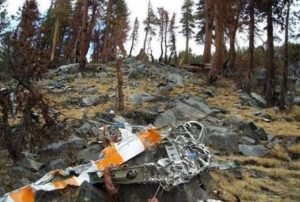
 Wave” where planes are seemingly ripped from the air and crashed to the ground.” Of course, many experts believe they are pilot error, inexperienced pilots getting caught in turbulence, and the disorienting mountain terrain. I suppose that is possible, but that is a lot of cases over the past 60 years. Then again, not every plane that flies over the area disappears either, so who am I to say.
Wave” where planes are seemingly ripped from the air and crashed to the ground.” Of course, many experts believe they are pilot error, inexperienced pilots getting caught in turbulence, and the disorienting mountain terrain. I suppose that is possible, but that is a lot of cases over the past 60 years. Then again, not every plane that flies over the area disappears either, so who am I to say.
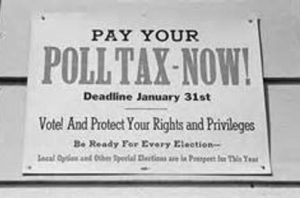 Those of us living today, might not have heard of a thing called a Poll Tax, but it was a very real thing, and with the election process just behind us, I think this might be something worth hearing. The Poll Tax was also known as a head tax or a capitation tax (meaning a tax for a head count). When I first thought about this particular tax, I thought well, maybe that kind of a tax could have ensured a fair election, but really, the opposite is true. While the head tax was considered an important source of revenue for many governments, from ancient times until the 19th century, in the United States at least; voting poll taxes (whose payment was a precondition to voting in an election) have been used to disenfranchise impoverished and minority voters (especially under Reconstruction). I find that absolutely unbelievable. In this nation in most election years, we have to practically beg people to get out and vote. Charging them money for it would all but insure a poor turnout. It would also insure that only those well enough off to be able to “throw money” at an election would be able to vote. Now that is truly appalling.
Those of us living today, might not have heard of a thing called a Poll Tax, but it was a very real thing, and with the election process just behind us, I think this might be something worth hearing. The Poll Tax was also known as a head tax or a capitation tax (meaning a tax for a head count). When I first thought about this particular tax, I thought well, maybe that kind of a tax could have ensured a fair election, but really, the opposite is true. While the head tax was considered an important source of revenue for many governments, from ancient times until the 19th century, in the United States at least; voting poll taxes (whose payment was a precondition to voting in an election) have been used to disenfranchise impoverished and minority voters (especially under Reconstruction). I find that absolutely unbelievable. In this nation in most election years, we have to practically beg people to get out and vote. Charging them money for it would all but insure a poor turnout. It would also insure that only those well enough off to be able to “throw money” at an election would be able to vote. Now that is truly appalling.
It is my understanding that originally the “poll tax” or maybe more correctly, head tax was not about an election, but more like the census. It even has Biblical roots…Mary and Joseph went to Bethlehem to be counted and pay their taxes to Caesar Augustus. This was the first of the head taxes. The tax might have been originally a way to bring in revenue. The poll taxes that followed, in most cases, were purely discriminatory. 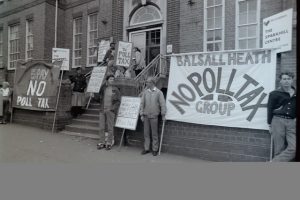 These latter poll taxes ensured that only wealthy people got the chance to cast their vote…thereby putting in candidates that those in charge wanted.
These latter poll taxes ensured that only wealthy people got the chance to cast their vote…thereby putting in candidates that those in charge wanted.
While the Poll Tax might have been a way to bring in money for governments, it seems to me that it could also be a way to make sure that the people vote for the candidate the government wants. Those who might have voted for change to improve the situation in their own neighborhoods, towns, cities, and states, were usually the poorer people, but they couldn’t vote for someone who could help, because they didn’t have the money. Many of these people were minorities. Head taxes were important sources of revenue for many governments from ancient times until the 19th century. In the United Kingdom, poll taxes were levied by the governments of John of Gaunt in the 14th century, Charles II in the 17th and Margaret Thatcher in the 20th century. By their very nature, poll taxes are considered very regressive taxes, are usually very unpopular and have been implicated in many uprisings.
On August 27, 1962, the Twenty-fourth Amendment (Amendment XXIV) of the United States Constitution was proposed. The Twenty-fourth Amendment prohibits both Congress and the states from conditioning the right to vote in federal elections on payment of a poll tax or other types of tax. The amendment was ratified by the states on January 23, 1964. When the 24th Amendment was ratified in 1964, five states still retained a poll tax. Those states were Alabama, Arkansas, Mississippi, Texas, and Virginia. These states continues the practice  even though the amendment prohibited requiring a poll tax for voters in federal elections. Finally, in 1966 the US Supreme Court ruled 6–3 in Harper v. Virginia Board of Elections, that poll taxes for any level of elections were unconstitutional. The ruling stated that the poll tax violated the Equal Protection Clause of the Fourteenth Amendment. Further litigation related to potential discriminatory effects of voter registration requirements has generally been based on application of this clause. Those of us living today, might not have heard of a thing called a Poll Tax, but it was a very real thing, and with the election process just behind us, I think this might be something worth hearing. The Poll Tax was also known as a head tax or a capitation tax (meaning a tax for a head count).
even though the amendment prohibited requiring a poll tax for voters in federal elections. Finally, in 1966 the US Supreme Court ruled 6–3 in Harper v. Virginia Board of Elections, that poll taxes for any level of elections were unconstitutional. The ruling stated that the poll tax violated the Equal Protection Clause of the Fourteenth Amendment. Further litigation related to potential discriminatory effects of voter registration requirements has generally been based on application of this clause. Those of us living today, might not have heard of a thing called a Poll Tax, but it was a very real thing, and with the election process just behind us, I think this might be something worth hearing. The Poll Tax was also known as a head tax or a capitation tax (meaning a tax for a head count).

 My nephew, Dave Chase has been such a blessing to our family since he married my niece, Toni. Dave always goes above and beyond just being Toni’s husband. Dave treats Toni like a queen. She feels his love in everything he said says, and that is a beautiful kind of love to have. Dave is devoted to his family. He and Toni’s son, James are good friends, and Dave never tries to take the place of James’ dad, but he is always there for him too. As a family, they have taken many trips, and seen many places. Dave likes to travel, and so do Toni and James, so it works out well for all. Of course, 2020 was…very different, for all of us.
My nephew, Dave Chase has been such a blessing to our family since he married my niece, Toni. Dave always goes above and beyond just being Toni’s husband. Dave treats Toni like a queen. She feels his love in everything he said says, and that is a beautiful kind of love to have. Dave is devoted to his family. He and Toni’s son, James are good friends, and Dave never tries to take the place of James’ dad, but he is always there for him too. As a family, they have taken many trips, and seen many places. Dave likes to travel, and so do Toni and James, so it works out well for all. Of course, 2020 was…very different, for all of us.
With Covid-19, everyone spent most of the year doing a new activity…social distancing. It is a phrase we have all learned to hate. We were stuck at home, not travel, no restaurants, no movies, even no camping…in the woods, away from people, for Pete’s sake. Some of that is behinds us now, or at least for now, but during the year, it was pretty awful. For the average person the problems were truly annoying, but for lots of people the problems were much worse. One of the biggest problems was depression. But other serious problems include loneliness, fear, and helplessness.
All that is the norm for the Covid-19 Lockdowns, but not if you’re Dave Chase. I would have expected Dave to be going stir-crazy…especially since Dave, Toni, and James did not catch Covid-19. Dave is very sports oriented. He always has been, but he did not let the lack of sports, gyms, and any other form of activities get him down. Dave just shifted gears and embraced the lockdowns by learning how to do indoor golf, online fantasy football, baseball, golf, and college basketball. Lots of guys go in for that, but I don’t think it would be for me. Once people could go outside much, Dave was out there fishing, and having good success at it too. As things finally started opening up, at least in Wyoming, Dave has been able to go back to playing live basketball, 
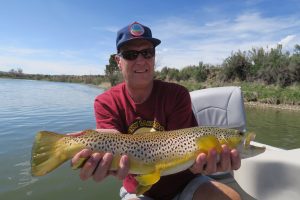 recently. You might think that after not playing for a long time, Dave might be a bit rusty, but not so. He is still the champ, even among his 30-year younger teammates. Dave has also enjoyed being able to have friends come over, like his buddy, Ron Birks. So, even with the Covid-19 Lockdown, Dave has stayed pretty sane. Not bad!! Not bad at all!! Today is Dave’s birthday. Happy birthday Dave!! Have a great day!! We love you!!
recently. You might think that after not playing for a long time, Dave might be a bit rusty, but not so. He is still the champ, even among his 30-year younger teammates. Dave has also enjoyed being able to have friends come over, like his buddy, Ron Birks. So, even with the Covid-19 Lockdown, Dave has stayed pretty sane. Not bad!! Not bad at all!! Today is Dave’s birthday. Happy birthday Dave!! Have a great day!! We love you!!
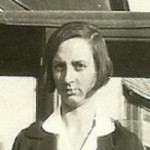
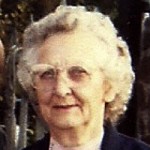 My husband’s grandmother, Vina Hein was an amazing woman. We always loved going up to visit her and Grandpa Hein. They lived on a ranch outside of Forsyth, Montana, and that place will forever live in my memory files. I can see every part of the house and the different things we did there. I remember all the nights of playing cards. We always played “Spades” and Grandma always had a funny saying when she looked at her hand and it wasn’t a good one. She would tell us that she had “a hand like a foot!!” We often looked through all the old photo albums too. Those pictures are great treasures, and I feel privileged to have been able to look through them. They were pure family history. Going to see Grandma and Grandpa Hein was such a blessing, and one I will always cherish.
My husband’s grandmother, Vina Hein was an amazing woman. We always loved going up to visit her and Grandpa Hein. They lived on a ranch outside of Forsyth, Montana, and that place will forever live in my memory files. I can see every part of the house and the different things we did there. I remember all the nights of playing cards. We always played “Spades” and Grandma always had a funny saying when she looked at her hand and it wasn’t a good one. She would tell us that she had “a hand like a foot!!” We often looked through all the old photo albums too. Those pictures are great treasures, and I feel privileged to have been able to look through them. They were pure family history. Going to see Grandma and Grandpa Hein was such a blessing, and one I will always cherish.
Grandma Hein was born on Groundhog’s Day, a fact that she enjoyed very much. It seems that finding out if spring would come early each year was something special. Of course, the biggest problem with that is that all too often Punxsutawney Phil was, and still is, very wrong. I have given up on that silly ground hog!! Even with this morning’s prediction that we will have 6 more weeks of Winter, it would be just a coincidence if that is the way it went, because that silly ground hog gets it wrong 99% of the time. Still, for Grandma, it was cool to have that birthday. I guess that when you think about it, at least you were on the downhill side of the Winter, so spring was coming.
I think Grandma was like me, in that Winter was her least favorite season. Living in the country is more work anyway, and the Winter weather makes it worse. Montana winters are notoriously bitter, so I can see why she would rather have any other season. Grandma wasn’t one to have lots of flowers in the house, that I recall, but 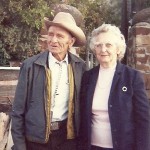
 that didn’t mean she couldn’t grow a garden, because she certainly could. She canned vegetables and made jellies and apple butter. She also made wonderful strawberry-rhubarb pie. there was also always plant of fresh real cream on her table from the cows they milked. You haven’t tasted cream, until you have had it fresh, without all the processing. Oh my!! It is so good. I will never forget the trips we took to see Grandma and Grandpa Hein. I will always have those cherished memories. Today would have been Grandma Hein’s 112th birthday. Happy birthday in Heaven Grandma Hein. We love and miss you very much.
that didn’t mean she couldn’t grow a garden, because she certainly could. She canned vegetables and made jellies and apple butter. She also made wonderful strawberry-rhubarb pie. there was also always plant of fresh real cream on her table from the cows they milked. You haven’t tasted cream, until you have had it fresh, without all the processing. Oh my!! It is so good. I will never forget the trips we took to see Grandma and Grandpa Hein. I will always have those cherished memories. Today would have been Grandma Hein’s 112th birthday. Happy birthday in Heaven Grandma Hein. We love and miss you very much.

 Anyone who knows anything about the space program, knows about the disasters that have come out of it…or at least some of them. One of those disasters, the breakup of Space Shuttle Columbia, happened 18 years ago today, February 1, 2003. The breakup upon re-entry into Earth’s atmosphere took the lives of all seven astronauts on board, in a way that we can only imagine as horrific. The best we can hope for following the tragedy is that the astronauts were killed instantly, so they did not suffer in what followed the breakup. It was a horrible day for the United States, and for NASA, but what followed that terrible disaster was a truly remarkable phenomena.
Anyone who knows anything about the space program, knows about the disasters that have come out of it…or at least some of them. One of those disasters, the breakup of Space Shuttle Columbia, happened 18 years ago today, February 1, 2003. The breakup upon re-entry into Earth’s atmosphere took the lives of all seven astronauts on board, in a way that we can only imagine as horrific. The best we can hope for following the tragedy is that the astronauts were killed instantly, so they did not suffer in what followed the breakup. It was a horrible day for the United States, and for NASA, but what followed that terrible disaster was a truly remarkable phenomena.
It is tragedies like the Space Shuttle Columba that bring out the true American spirit. Feelings are set aside, and you suddenly see people hugging each other to comfort them. Columbia broke up in the skies of East Texas on its way back home to Kennedy Space Center. Almost immediately after losing the craft, the NASA world and many others, converged on the small town of Hemphill, Texas. Everyone wanted to help, and many who were not called into service, volunteered. The Space Program had become so commonplace and so routine that such an event came as a horrible shock to this nation and to the world. Suddenly we were glued to our television sets or radios, waiting for news, hoping against hope that there might be survivors, but knowing that it was clearly not possible.
It wasn’t just the NASA teams who showed up for this tragic event. Restaurants gave free meals to the workers. People reported anything they found so it could be documented and processed. The townspeople were there to offer comfort to those in need, because lets face it, these astronauts were members of the NASA family, and NASA (as well as the rest of the nation) was in mourning. As time went on, more and more searchers converged on Hemphill and the surrounding area. The local heroes continued to step up, giving any kind of support needed. This might seem like a small feat to some people, but this search went on for three months. That is a long time to care for so many in such a small town, but it was desperately needed, and 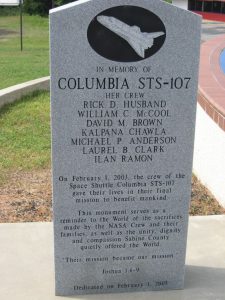
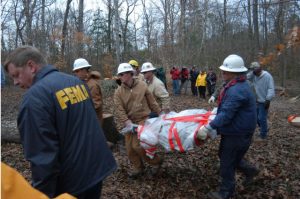 gratefully received. After a long, drawn-out search, the teams had found all the seemed to be going to find, and almost as quickly as they had arrived, the teams were gone, and the small town of Hemphill, Texas was quiet again, but it would never be the same again. Three months in 2003 had changed it forever. The people who lived there in that time will never forget what they did back then, and we will never forget what they did. It was an awesome feat of kindness and love for our fellow man.
gratefully received. After a long, drawn-out search, the teams had found all the seemed to be going to find, and almost as quickly as they had arrived, the teams were gone, and the small town of Hemphill, Texas was quiet again, but it would never be the same again. Three months in 2003 had changed it forever. The people who lived there in that time will never forget what they did back then, and we will never forget what they did. It was an awesome feat of kindness and love for our fellow man.
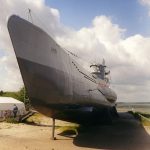 On January 31, 1917, at the height of World War I, Germany announced that they would renew the use of unrestricted submarine warfare in the Atlantic Ocean. The German torpedo-armed submarines, known as U-Boats, prepared to attack any and all ships operating in the Atlantic, including civilian passenger carriers, which were said to have been sighted in war-zone waters. They were prepared to attack without a second thought, whether they were innocent civilians or not. Unleashing the U-Boats was almost like unleashing terrorists, because the U-Boats were an invisible enemy. Yes, the could be seen, but beneath the surface of the water, they could easily hide in the murky darkness, unleashing their torpedoes to go streaking through the water. The first sign of danger was when the doomed ship watchmen saw the dreaded white streak coming at them through the water. There was no time to take evasive action. The ship could not move that fast, and it could not turn on a dime. They were sitting ducks.
On January 31, 1917, at the height of World War I, Germany announced that they would renew the use of unrestricted submarine warfare in the Atlantic Ocean. The German torpedo-armed submarines, known as U-Boats, prepared to attack any and all ships operating in the Atlantic, including civilian passenger carriers, which were said to have been sighted in war-zone waters. They were prepared to attack without a second thought, whether they were innocent civilians or not. Unleashing the U-Boats was almost like unleashing terrorists, because the U-Boats were an invisible enemy. Yes, the could be seen, but beneath the surface of the water, they could easily hide in the murky darkness, unleashing their torpedoes to go streaking through the water. The first sign of danger was when the doomed ship watchmen saw the dreaded white streak coming at them through the water. There was no time to take evasive action. The ship could not move that fast, and it could not turn on a dime. They were sitting ducks.
The vast majority of people of the United States favored neutrality when it came to World War I. So when the war erupted in 1914, President Woodrow Wilson pledged the stay neutral. The problem was that Britain was one of America’s closest trading partners. That created serious tension between the United States and Germany, when Germany attempted a blockade of the British isles. Several US ships traveling to Britain were damaged or sunk by German mines and, in February 1915, Germany announced unrestricted warfare against all ships, neutral or otherwise, that entered the war zone around Britain. One month later, Germany announced that a German cruiser had sunk the William P. Frye, a private American merchant vessel that was transporting grain to England when it disappeared. President Wilson was outraged, but the German government apologized, calling the attack an unfortunate mistake. That didn’t stop their reign of terror, however. In November they sank an Italian liner without warning, killing 272 people, including 27 Americans. Public opinion concerning the war, and the stand of the United States in it began to change. It was time for the United States to get into World War I.
The Germans were far in advance of other nations when it came to submarines. The U-boat was 214 feet long, carried 35 men and 12 torpedoes, and could travel underwater for two hours at a time. In the first few years of World War I, the U-boats took a terrible toll on Allied shipping. In early May 1915, several New York newspapers had to publish a warning by the German embassy in Washington that Americans traveling on British or Allied ships in war zones did so at their own risk. The announcement was placed on the same page as an advertisement for the imminent sailing of the British-owned Lusitania ocean liner from New York to Liverpool. I’m sure they had hoped that people would heed the warning, but many people boarding the Lusitania either didn’t take notice of the warning or they didn’t see it. On May 7, the Lusitania was torpedoed without warning just off the coast of Ireland. Of the 1,959 passengers, 1,198 were killed, including 128 Americans. The Germans had proven once again that they were ruthless and conniving. Following the sinking of the Lusitania The German government accused the Lusitania was carrying munitions. The US demanded an end to German attacks on unarmed passenger and merchant ships, and full repayment for the loss.
Following the sinking of the Lusitania the German government accused the Lusitania was carrying munitions. The US demanded an end to German attacks on unarmed passenger and merchant ships, and full repayment for the loss. Germany countered with a pledge to see to the safety of passengers before sinking unarmed vessels in August 1915. All that changed by January 1917, when Germany, determined to win its war of attrition against the Allies, announced the resumption of unrestricted warfare. Three days later, the United States broke off diplomatic relations with Germany, who, just hours later sunk the American liner Housatonic. None of the 25 Americans on board were killed and they were picked up by a British steamer.
On February 22, Congress passed a $250 million arms-appropriations bill intended to ready the United States for war. British authorities gave the US ambassador to Britain a copy of what has become known as the “Zimmermann Note,” a coded message from German Foreign Secretary Arthur Zimmermann to Count Johann von Bernstorff, the German ambassador to Mexico. In the telegram, intercepted and deciphered by British intelligence, Zimmermann stated that, in the event of war with the United States, Mexico should be asked to 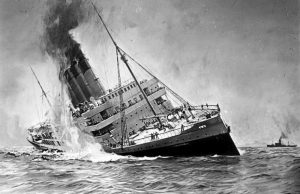 enter the conflict as a German ally. In return, Germany would promise to restore to Mexico the lost territories of Texas, New Mexico and Arizona. On March 1, the outraged US State Department published the note and America was galvanized against Germany once and for all. In late March, Germany sank four more US merchant ships. President Wilson appeared before Congress and called for a declaration of war against Germany on April 2nd. On April 4th, the Senate voted 82 to six to declare war against Germany. Two days later, the House of Representatives endorsed the declaration by a vote of 373 to 50 and America formally entered World War I. They were after that invisible enemy, and they were determined to find it and destroy it.
enter the conflict as a German ally. In return, Germany would promise to restore to Mexico the lost territories of Texas, New Mexico and Arizona. On March 1, the outraged US State Department published the note and America was galvanized against Germany once and for all. In late March, Germany sank four more US merchant ships. President Wilson appeared before Congress and called for a declaration of war against Germany on April 2nd. On April 4th, the Senate voted 82 to six to declare war against Germany. Two days later, the House of Representatives endorsed the declaration by a vote of 373 to 50 and America formally entered World War I. They were after that invisible enemy, and they were determined to find it and destroy it.

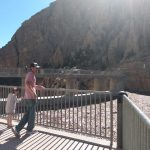
 My nephew, Chris Iverson is an avid outdoorsman. He loves camping, fishing, and guns. That is pretty typical of people who live in Wyoming. If Chris and my niece, Cassie could live totally off the grid, I think they would, and if the someday move off the grid, I won’t be one bit surprised. Sometimes, living in town just gets to bee too much for them, and they will load up their camper trailer, and head for the mountains. It is wonderful for their kids, Lucas and Zoey too. They love being in the mountains, especially with family and friends.
My nephew, Chris Iverson is an avid outdoorsman. He loves camping, fishing, and guns. That is pretty typical of people who live in Wyoming. If Chris and my niece, Cassie could live totally off the grid, I think they would, and if the someday move off the grid, I won’t be one bit surprised. Sometimes, living in town just gets to bee too much for them, and they will load up their camper trailer, and head for the mountains. It is wonderful for their kids, Lucas and Zoey too. They love being in the mountains, especially with family and friends.
When Chris and Cassie had Lucas, there were some challenges. Lucas was born with Down Syndrome, and many parents would have considered other possible avenues of dealing with a known birth defect, but for Chris 
 and Cassie, that was not an option. Lucas with their precious baby, and he was who he was. They loved him and cherished him, and he has grown into a wonderful little boy. Chris and Cassie, are great parents, and they have trained both of their children to be wonderful, caring children who love and respect their siblings
and Cassie, that was not an option. Lucas with their precious baby, and he was who he was. They loved him and cherished him, and he has grown into a wonderful little boy. Chris and Cassie, are great parents, and they have trained both of their children to be wonderful, caring children who love and respect their siblings
Chris loves his family with all his heart, and always tries to do whatever he can to life better for them. He has the ability to fix his cars, so that saves him money, that can be better used in support of his family. Life isn’t always easy for the Iverson family. Medical bills have plagued them from time to time, but they have continued to persevere, and I know they will do so in the future. Today is Chris’ birthday. Happy birthday Chris!! Have a great day!! We love you!!
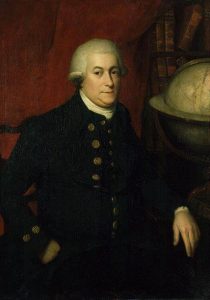 Captain George Vancouver, a British Officer, commanded the HMS Discovery and its accompanying ships on an exploratory voyage of the Pacific Northwest, between the years of 1791 and 1794. Vancouver and his crew were privileged to be the first to see places like Mount Saint Helens and the first to explore the Puget Sound. Their goal was to explore every bay and outlet in the region…following the coasts of Oregon and Washington. Men were sent in smaller boats to explore the Columbia River and enter the strait of Juan de Fuca.
Captain George Vancouver, a British Officer, commanded the HMS Discovery and its accompanying ships on an exploratory voyage of the Pacific Northwest, between the years of 1791 and 1794. Vancouver and his crew were privileged to be the first to see places like Mount Saint Helens and the first to explore the Puget Sound. Their goal was to explore every bay and outlet in the region…following the coasts of Oregon and Washington. Men were sent in smaller boats to explore the Columbia River and enter the strait of Juan de Fuca.
The larger ships, including the Chatham…the Armed Tender of the HMS Discovery, often anchored in the safe harbors, while the smaller vessels explored the many channels and rivers along the coast. On April 29, 1792, the ships entered the Straits of Juan de Fuca and anchored in the calm waters of Discovery Bay. While the ships stayed in the bay…using it as a base, Vancouver and his men explored the waters of Admiralty Inlet and Hood Canal. After several weeks of exploring, the Chatham began to sail north across the Straits of Juan de Fuca to explore the San Juan and Lopez Islands. After successfully exploring the islands, the Chatham sailed southward in May to rejoin the HMS Discovery and continue their explorations south. They moved the explorations south, as far as Commencement Bay in Tacoma, before turning around and returning north, where they hoped that the waters were going to be safer.
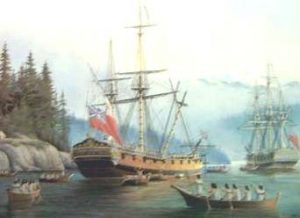 When the ships arrived at the Puget Sound, a storm was raging, accompanied by severe currents and tides. While crossing an unknown channel, the Chatham was caught by a flood tide and swept away helpless. In an effort to slow her progress, the crew dropped her stream anchor. Unfortunately, the strain was too much and the cable snapped. Amazingly, the Chatham survived, but the sweep of the waters did not locate the lost anchor, so the ship rejoined the HMS Discovery.
When the ships arrived at the Puget Sound, a storm was raging, accompanied by severe currents and tides. While crossing an unknown channel, the Chatham was caught by a flood tide and swept away helpless. In an effort to slow her progress, the crew dropped her stream anchor. Unfortunately, the strain was too much and the cable snapped. Amazingly, the Chatham survived, but the sweep of the waters did not locate the lost anchor, so the ship rejoined the HMS Discovery.
Vancouver’s journal entry for June 9, 1792 read, “We found tides here extremely rapid, and on the 9th in endeavoring to get around a point to the Bellingham Bay we were swept leeward of it with great impetuosity. We let go the anchor in 20 fathoms but in bringing it up such was the force of the tide that we parted the cable. At slack water we swept for the anchor but could not get it. After several fruitless attempts, we were at last obliged to leave it.”
These days, the anchor would be a treasure of great value, which motivated a company called Anchor Ventures,  LLC of Seattle to initiate a search of not the Cannel, but rather off Whidbey Island’s northwestern shore. Their bet that the Chatham wasn’t with the Discovery at the time of the storm apparently paid off. Anchor Ventures pulled up what they believe to be the long lost anchor in 2014. Since then, the team has been trying to prove its identity. Skeptics aren’t so sure that this is the right anchor, because they say it is heavier than those of the late 1700s. That said, the question remains. Is the anchor still there, or did they jump to conclusions. It’s hard to say, and proof will be tough to find. I think it is not likely that they found the right anchor…especially looking in the wrong place.
LLC of Seattle to initiate a search of not the Cannel, but rather off Whidbey Island’s northwestern shore. Their bet that the Chatham wasn’t with the Discovery at the time of the storm apparently paid off. Anchor Ventures pulled up what they believe to be the long lost anchor in 2014. Since then, the team has been trying to prove its identity. Skeptics aren’t so sure that this is the right anchor, because they say it is heavier than those of the late 1700s. That said, the question remains. Is the anchor still there, or did they jump to conclusions. It’s hard to say, and proof will be tough to find. I think it is not likely that they found the right anchor…especially looking in the wrong place.
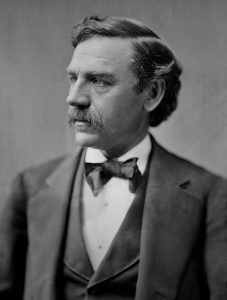 As is common with ships, the William P. Frye was a four-masted steel barque named after a US Republican politician of the same name, from the state of Maine. The ship was built by Arthur Sewall and Co of Bath, Maine in 1901. For a time, the ship had a great run…until 1915, that is. The ship sailed from Seattle, Washington on November 4, 1914, with a cargo of 189,950 US bushels of wheat. The ship and its cargo were bound for Queenstown, Falmouth, or Plymouth in the United Kingdom. In 1915 the United Kingdom was at war with Imperial Germany, but the United States was not enter the war yet and was officially neutral. It was early in the war, but that doesn’t make it any less dangerous to sail the high seas.
As is common with ships, the William P. Frye was a four-masted steel barque named after a US Republican politician of the same name, from the state of Maine. The ship was built by Arthur Sewall and Co of Bath, Maine in 1901. For a time, the ship had a great run…until 1915, that is. The ship sailed from Seattle, Washington on November 4, 1914, with a cargo of 189,950 US bushels of wheat. The ship and its cargo were bound for Queenstown, Falmouth, or Plymouth in the United Kingdom. In 1915 the United Kingdom was at war with Imperial Germany, but the United States was not enter the war yet and was officially neutral. It was early in the war, but that doesn’t make it any less dangerous to sail the high seas.
When the ship was near the coast of Brazil, the Imperial German Navy raider SMS Prinz Eitel Friedrich overtook the William P. Frye on January 27, 1915. The Germans stopped and boarded the ship. I can’t imagine what it must have been like to have an enemy navy detain a ship I was on. You just never know what they are going to do. The William P. Frye was owned by the United States, and so a neutral ship. The ship should have been treated 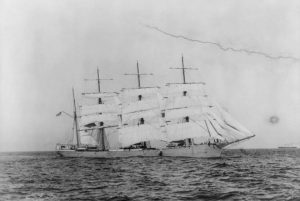 as neutral. The problem the William P. Frye had is that the cargo was deemed a legitimate war target because the Germans believed it was bound for Britain’s armed forces. In reality, even detaining the ship was probably an act of war, but that never seemed to bother the Germans anyway.
as neutral. The problem the William P. Frye had is that the cargo was deemed a legitimate war target because the Germans believed it was bound for Britain’s armed forces. In reality, even detaining the ship was probably an act of war, but that never seemed to bother the Germans anyway.
Upon making his decision that the William P. Frye was a legitimate target, the captain of SMS Prinz Eitel Friedrich, Max Thierichens, ordered that William P. Frye’s cargo of wheat be thrown overboard. The captain and crew began to comply, most likely begrudgingly, and when the orders were not followed fast enough, he took the ship’s crew and passengers prisoner. Then he ordered the ship scuttled on January 28, 1915. The William P. Frye was the first American vessel sunk during World War I, and the United States wasn’t even in the war yet. The 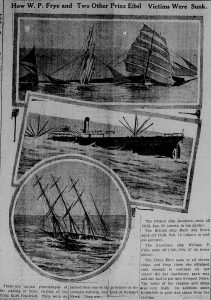 owners of the ship, Arthur Sewall and Co, wanted damages for the sinking of the ship and presented a claim for $228,059.54, which would total $5,763,800 today. In all, the SMS Prinz Eitel Friedrich scuttled eleven ships during their reign of terror. They stole coal and gold from their victims, which kept them going for a while, until they developed engine trouble.
owners of the ship, Arthur Sewall and Co, wanted damages for the sinking of the ship and presented a claim for $228,059.54, which would total $5,763,800 today. In all, the SMS Prinz Eitel Friedrich scuttled eleven ships during their reign of terror. They stole coal and gold from their victims, which kept them going for a while, until they developed engine trouble.
In another act of war, Thierichens took the passengers and the crew captive. Women and children, were part of approximately 350 people taken prisoner from eleven different ships that SMS Prinz Eitel Friedrich’s crew had searched and destroyed. I suppose the possible act of war was somewhat forgiven when all 350 were released on March 10, 1915, when the German raider had engine trouble, and docked Newport News, Virginia, but then again, what else could they do with them. Nevertheless, an outraged American government forced the Germans to apologize for the sinking, and of course, the SMS Prinz Eitel Friedrich was detained in port.

 My niece, Lacey Stevens is a super successful cosmetologist. She is probably the youngest store manager for Ulta Beauty, as well as their top seller and earns a good amount of money in commissions. If you want an appointment with Lacey, you had better plan ahead. Lacey is booked out a month or more for hair and makeup. Lacey is a role model for all of the employees in the salon and store, and they come to her for advice on what products to use for which hair problem or facial problem or for make up tips. Of course, one look at her and you can see why. Lacey is an expert a both hair and makeup. She always looks stunning…model quality. She always looks the part of a beautiful woman that people want to copy. She is the epitome of success and beauty.
My niece, Lacey Stevens is a super successful cosmetologist. She is probably the youngest store manager for Ulta Beauty, as well as their top seller and earns a good amount of money in commissions. If you want an appointment with Lacey, you had better plan ahead. Lacey is booked out a month or more for hair and makeup. Lacey is a role model for all of the employees in the salon and store, and they come to her for advice on what products to use for which hair problem or facial problem or for make up tips. Of course, one look at her and you can see why. Lacey is an expert a both hair and makeup. She always looks stunning…model quality. She always looks the part of a beautiful woman that people want to copy. She is the epitome of success and beauty.

Lacey has been in a relationship with Chris Killinger for about a year and a half now, and he brought with him the blessing of his two children, Brooklyn and Jaxon. The kids have been a great addition to the family, and Lacey’s niece, Elliott loves them very much, as does the rest of the family. Brooklyn loves to sit at Lacey’s vanity table and watch her do her makeup. She find that process intriguing. Lacey is so good with her, and sometimes she puts a little makeup on Brooklyn. Every little girl needs that, I say, and what better person to help Brooklyn with a little dress-up, than Lacey. She has been a blessing to Chris and to his kids, just as they have been to her.
Lacey’s family loves to spend time at the lake in the summer. Pathfinder Reservoir is their favorite place to go. She and Chris took the kids there for the annual summer gathering, and everyone had an absolute blast. Children 
 always add a special touch to any family gathering. Brooklyn and Jaxon are no exception. Life’s journey always has its twists and turns, but the turn that let Lacey to meet Chris is considered a wonderful one. Lacey is so happy, and that, in my book, makes Chris a great guy. We will see where the future leads them, but for now, they are just enjoying the time together. It is the same in much of Lacey’s life. Things are going so well, and Lacey is very happy and content….just enjoying the ride. Today is Lacey’s birthday. Happy birthday Lacey!! Have a great day!! We love you!!
always add a special touch to any family gathering. Brooklyn and Jaxon are no exception. Life’s journey always has its twists and turns, but the turn that let Lacey to meet Chris is considered a wonderful one. Lacey is so happy, and that, in my book, makes Chris a great guy. We will see where the future leads them, but for now, they are just enjoying the time together. It is the same in much of Lacey’s life. Things are going so well, and Lacey is very happy and content….just enjoying the ride. Today is Lacey’s birthday. Happy birthday Lacey!! Have a great day!! We love you!!

